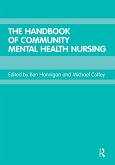The Handbook of Community Mental Health Nursing
Herausgeber: Coffey, Michael; Hannigan, Ben
The Handbook of Community Mental Health Nursing
Herausgeber: Coffey, Michael; Hannigan, Ben
- Gebundenes Buch
- Merkliste
- Auf die Merkliste
- Bewerten Bewerten
- Teilen
- Produkt teilen
- Produkterinnerung
- Produkterinnerung
This book brings together authoritative contributions from leading mental health researchers, educators and practitioners to provide a comprehensive text for community mental health nurses in training and in practice.
Andere Kunden interessierten sich auch für
![The Handbook of Community Mental Health Nursing The Handbook of Community Mental Health Nursing]() The Handbook of Community Mental Health Nursing80,99 €
The Handbook of Community Mental Health Nursing80,99 €![The Handbook of Forensic Mental Health in Africa The Handbook of Forensic Mental Health in Africa]() The Handbook of Forensic Mental Health in Africa69,99 €
The Handbook of Forensic Mental Health in Africa69,99 €![Routledge Handbook of Global Mental Health Nursing Routledge Handbook of Global Mental Health Nursing]() Routledge Handbook of Global Mental Health Nursing352,99 €
Routledge Handbook of Global Mental Health Nursing352,99 €![Routledge Handbook of Global Mental Health Nursing Routledge Handbook of Global Mental Health Nursing]() Routledge Handbook of Global Mental Health Nursing65,99 €
Routledge Handbook of Global Mental Health Nursing65,99 €![The Story of Nursing in British Mental Hospitals The Story of Nursing in British Mental Hospitals]() Niall McCraeThe Story of Nursing in British Mental Hospitals74,99 €
Niall McCraeThe Story of Nursing in British Mental Hospitals74,99 €![The Story of Nursing in British Mental Hospitals The Story of Nursing in British Mental Hospitals]() Niall McCraeThe Story of Nursing in British Mental Hospitals206,99 €
Niall McCraeThe Story of Nursing in British Mental Hospitals206,99 €![Mental Health Issues and the Media Mental Health Issues and the Media]() Gary MorrisMental Health Issues and the Media65,99 €
Gary MorrisMental Health Issues and the Media65,99 €-
-
-
This book brings together authoritative contributions from leading mental health researchers, educators and practitioners to provide a comprehensive text for community mental health nurses in training and in practice.
Hinweis: Dieser Artikel kann nur an eine deutsche Lieferadresse ausgeliefert werden.
Hinweis: Dieser Artikel kann nur an eine deutsche Lieferadresse ausgeliefert werden.
Produktdetails
- Produktdetails
- Verlag: Routledge
- Seitenzahl: 444
- Erscheinungstermin: 19. Juni 2003
- Englisch
- Abmessung: 250mm x 175mm x 28mm
- Gewicht: 940g
- ISBN-13: 9780415280358
- ISBN-10: 0415280354
- Artikelnr.: 21256811
- Herstellerkennzeichnung
- Libri GmbH
- Europaallee 1
- 36244 Bad Hersfeld
- gpsr@libri.de
- Verlag: Routledge
- Seitenzahl: 444
- Erscheinungstermin: 19. Juni 2003
- Englisch
- Abmessung: 250mm x 175mm x 28mm
- Gewicht: 940g
- ISBN-13: 9780415280358
- ISBN-10: 0415280354
- Artikelnr.: 21256811
- Herstellerkennzeichnung
- Libri GmbH
- Europaallee 1
- 36244 Bad Hersfeld
- gpsr@libri.de
Michael Coffey, Ben Hannigan
Section One: Context 1. The History of Community Mental Health Nursing 2.
The Frontline Workforce of Community Mental Health Care 3. The Policy and
Legal Context 4. Ethical Issues 5. Social Exclusion, Discrimination and
Social Isolation 6. Working in Multidisciplinary Community Teams 7. Meeting
Mental Health Needs in Primary Care 8. Collaborating with users of Services
9. Gender Issues 10. Culture and Ethnicity 11. Stress, Burnout and Coping
12. Clinical Supervision and Reflective Practice Section Two: Practice 13.
Promotion Mental Health 14. Using Evidence to Inform Practice 15. Assessing
Needs in Community Mental Health Care 16. Risk, Decision-Making and Mental
Health 17. Preventing Suicide 18. Working with Families I: Systematic
Approaches 19. Working with Families II: Psychological Interventions 20.
Cognitive Behaviour Therapy for Psychosis 21. Relapse Prevention in
Psychosis 22. Case Management and Assertive Outreach 23. Psychopharmacology
and Medication Management 24. Creativity and the Therapeutic Use of the
Arts 25. Working with Mentally Disordered Offenders 26. Working with People
with Co-existing Mental Health and Substance Misuse Problems 27. Working
with People Dementia and their Carers 28. Working with People with Mental
Health problems and Learning Disabilities 29. Current Approaches to Working
with Children and Adolescents Section Three: Education and Research 30.
Education and training for Community Mental Health Nurses 31. Developing
Courses in Psychosocial Interventions 32. The Contribution of Quantitative
approaches to Community Mental Health Nursing Research 33. The Contribution
of Qualitative Approaches to Community Mental Health Nursing Research
Conclusion
The Frontline Workforce of Community Mental Health Care 3. The Policy and
Legal Context 4. Ethical Issues 5. Social Exclusion, Discrimination and
Social Isolation 6. Working in Multidisciplinary Community Teams 7. Meeting
Mental Health Needs in Primary Care 8. Collaborating with users of Services
9. Gender Issues 10. Culture and Ethnicity 11. Stress, Burnout and Coping
12. Clinical Supervision and Reflective Practice Section Two: Practice 13.
Promotion Mental Health 14. Using Evidence to Inform Practice 15. Assessing
Needs in Community Mental Health Care 16. Risk, Decision-Making and Mental
Health 17. Preventing Suicide 18. Working with Families I: Systematic
Approaches 19. Working with Families II: Psychological Interventions 20.
Cognitive Behaviour Therapy for Psychosis 21. Relapse Prevention in
Psychosis 22. Case Management and Assertive Outreach 23. Psychopharmacology
and Medication Management 24. Creativity and the Therapeutic Use of the
Arts 25. Working with Mentally Disordered Offenders 26. Working with People
with Co-existing Mental Health and Substance Misuse Problems 27. Working
with People Dementia and their Carers 28. Working with People with Mental
Health problems and Learning Disabilities 29. Current Approaches to Working
with Children and Adolescents Section Three: Education and Research 30.
Education and training for Community Mental Health Nurses 31. Developing
Courses in Psychosocial Interventions 32. The Contribution of Quantitative
approaches to Community Mental Health Nursing Research 33. The Contribution
of Qualitative Approaches to Community Mental Health Nursing Research
Conclusion
Section One: Context 1. The History of Community Mental Health Nursing 2.
The Frontline Workforce of Community Mental Health Care 3. The Policy and
Legal Context 4. Ethical Issues 5. Social Exclusion, Discrimination and
Social Isolation 6. Working in Multidisciplinary Community Teams 7. Meeting
Mental Health Needs in Primary Care 8. Collaborating with users of Services
9. Gender Issues 10. Culture and Ethnicity 11. Stress, Burnout and Coping
12. Clinical Supervision and Reflective Practice Section Two: Practice 13.
Promotion Mental Health 14. Using Evidence to Inform Practice 15. Assessing
Needs in Community Mental Health Care 16. Risk, Decision-Making and Mental
Health 17. Preventing Suicide 18. Working with Families I: Systematic
Approaches 19. Working with Families II: Psychological Interventions 20.
Cognitive Behaviour Therapy for Psychosis 21. Relapse Prevention in
Psychosis 22. Case Management and Assertive Outreach 23. Psychopharmacology
and Medication Management 24. Creativity and the Therapeutic Use of the
Arts 25. Working with Mentally Disordered Offenders 26. Working with People
with Co-existing Mental Health and Substance Misuse Problems 27. Working
with People Dementia and their Carers 28. Working with People with Mental
Health problems and Learning Disabilities 29. Current Approaches to Working
with Children and Adolescents Section Three: Education and Research 30.
Education and training for Community Mental Health Nurses 31. Developing
Courses in Psychosocial Interventions 32. The Contribution of Quantitative
approaches to Community Mental Health Nursing Research 33. The Contribution
of Qualitative Approaches to Community Mental Health Nursing Research
Conclusion
The Frontline Workforce of Community Mental Health Care 3. The Policy and
Legal Context 4. Ethical Issues 5. Social Exclusion, Discrimination and
Social Isolation 6. Working in Multidisciplinary Community Teams 7. Meeting
Mental Health Needs in Primary Care 8. Collaborating with users of Services
9. Gender Issues 10. Culture and Ethnicity 11. Stress, Burnout and Coping
12. Clinical Supervision and Reflective Practice Section Two: Practice 13.
Promotion Mental Health 14. Using Evidence to Inform Practice 15. Assessing
Needs in Community Mental Health Care 16. Risk, Decision-Making and Mental
Health 17. Preventing Suicide 18. Working with Families I: Systematic
Approaches 19. Working with Families II: Psychological Interventions 20.
Cognitive Behaviour Therapy for Psychosis 21. Relapse Prevention in
Psychosis 22. Case Management and Assertive Outreach 23. Psychopharmacology
and Medication Management 24. Creativity and the Therapeutic Use of the
Arts 25. Working with Mentally Disordered Offenders 26. Working with People
with Co-existing Mental Health and Substance Misuse Problems 27. Working
with People Dementia and their Carers 28. Working with People with Mental
Health problems and Learning Disabilities 29. Current Approaches to Working
with Children and Adolescents Section Three: Education and Research 30.
Education and training for Community Mental Health Nurses 31. Developing
Courses in Psychosocial Interventions 32. The Contribution of Quantitative
approaches to Community Mental Health Nursing Research 33. The Contribution
of Qualitative Approaches to Community Mental Health Nursing Research
Conclusion








